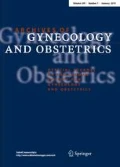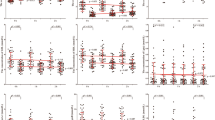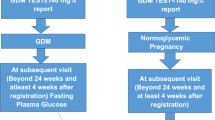Abstract
Objective
To determine the effects of fasting during the month of Ramadan on fetal development and maternal serum cortisol and lipid profile.
Methods
This study was performed in Obstetrics and Gynecology Department of Gaziantep University Hospital, between 23 September 2006 and 23 October 2006 (during the month of Ramadan). Thirty-six consecutive healthy women with uncomplicated pregnancies of 20 weeks or more, who were fasting during Ramadan, were included in the study group (group 1). The control group (group 2) consisted of 29 healthy pregnant women, who were not fasting during the study period. For evaluating Ramadan’s effect on fetus, Doppler ultrasonography was performed on all subjects in the beginning and then once a week until the end of Ramadan for the following measurements: increase of fetal biparietal diameter (BPD), increase of fetal femur length (FL), increase of estimated fetal body weight (EFBW), fetal biophysical profile (BPP), amniotic fluid index (AFI), and umbilical artery systole/diastole (S/D) ratio.
Maternal serum cortisol, triglyceride, total cholesterol, low-density lipoprotein (LDL), high-density lipoprotein (HDL), very low density lipoprotein (VLDL), and LDL/HDL ratio were also evaluated before and after Ramadan.
Results
No significant difference was found between the two groups for the fetal age, maternal weight gain (kilogram), estimated fetal weight gain (EFWG), fetal BPP, AFI, and umbilical artery S/D ratio. In the fasting group, the maternal serum cortisol levels on day 20 were significantly higher than the initial levels obtained 1 week prior to Ramadan (p < 0.05). Although no significant increases were observed in total cholesterol and triglyceride levels in the fasting group, these increases were significantly higher than those in the control group (p < 0.05). LDL and VLDL levels showed a non-significant decrease at the end of the Ramadan. HDL levels showed a slight increase, but LDL/HDL ratios were significantly decreased in fasting group (p < 0.05).
Conclusion
The results of this study showed that maternal serum cortisol level was elevated while LDL/HDL ratio were decreased in healthy women with uncomplicated pregnancies of 20 weeks or more, who were fasting during Ramadan. No untoward effect of Ramadan was observed on intrauterine fetal development.
Similar content being viewed by others
References
Reilly T, Waterhouse J (2007) Altered sleep-wake cycles and food intake: the Ramadan model. Physiol Behav 90:219–228
Robinson T, Raisler J (2005) Each one is a doctor for herself: Ramadan fasting among pregnant Muslim women in the United States. Ethn Dis 15(1 Suppl 1):S1–99–103.
Joosoph J, Abu J, Yu SL (2004) A survey of fasting during pregnancy. Singapore Med J 45:583–586
Kaplan M, Eidelman AI, Aboulafia Y (1983) Fasting and the precipitation of labor: the Yom Kippur effect. JAMA 250:1317–1318
Cross JH, Emerson J, Wharton BA (1990) Ramadan and birth weight at full term in Asian Moslem pregnant women in Birmingham. Arch DisChild 65:1053–1056
Hefni M, Fikry SAH, Abdalazim M, Abdelkhalik MA (1993) Fasting in Ramadan and preterm labour. Saudi Med J 14:130–132
Naderi T, Kamyabi Z (2004) Determination of fundal height increase in fasting and non-fasting pregnant women during Ramadan. Saudi Med J 25:809–810
Kamyabi Z, Naderi T (2004) The effect of Ramadan fasting on amniotic fluid volume.Saudi Med J 25:45–6.
Rabinerson D, Dicker D, Kaplan B, Ben-Rafael Z, Deke A (2000) l Hyperemesis gravidarum during Ramadan. J Psychosom Obstet Gynaecol 21:189–191
Fowler H, Griffin E, Lawton F, Buxton J, Luesley D (1990) Antenatal attendance and fasting of pregnant Muslims during Ramadan. Br J Obstet Gynaecol 97:861–862
Salleh H (1989) Ramadan fasting among pregnant women in Muar district, Malaysia and its association to health outcomes. Malays J Reprod Health 7:69–83
Malhotra A, Scott PH, Scott J, Gee H, Wharton BA (1989) Metabolic changes in Asian Muslim pregnant mothers observing the Ramadan fast in Britain. Br J Nutr 61:663–672
Prentice AM, Prentice A, Lamb WH, Lunn PG, Austin S (1983) Metabolic consequences of fasting during Ramadan in pregnant and lactating women. Hum Nutr Clin Nutr 37:283–294
Hadlock FP, Harrist RB, Sharman RS, Deter RL, Park SK (1985) Estimation of fetal weight with the use of head, body, and femur measurements—a prospective study. Am J Obstet Gynecol 151:333–337
Manning FA, Morrison I, Lange IR, Harman CR, Chamberlain PF (1985) Fetal assessment based on fetal biophysical profile scoring: experience in 12, 620 referred high-risk pregnancies I. Perinatal mortality by frequency and etiology. Am J Obstet Gynecol 151:343–350
Alfirevic Z, Neilson JP (1995) Doppler ultrasonography in high risk pregnancies: systematic review with meta-analysis. Am J Obstet Gynaecol 172:1379
Nelson W, Cadotte L, Halberg F (1973) Circadian timing of single daily meal affects survival of mice. Proc Soc Exp Biol Med 144:766–769
Salem BL, B’chir S, B’chir F, Bouguerra R et al (2002) Circadian rhytm of cortisol and its responsiveness to ACTH during Ramadan. Ann Endocrinol 63:497–501
Ziaee V, Razaei M, Ahmadinejad Z, Shaikh H, Yousefi R, Yarmohammadi L, Bozorgi F, Behjati MJ (2006) The changes of metabolic profile and weight during Ramadan fasting. Singapore Med J 47:409–414
Tsai AC, Sandretto A, Chung YC (2003) Dieting is more effective in reducing weight but exercise is more effective in reducing fat during the early phase of a weight-reducing program in healthy humans. J Nutr Biochem 14:541–549
Afrasiabi A, Hassanzadeh S, Sattarivand R, Mahboob S (2003) Effects of Ramadan fasting on serum lipid profiles on 2 hyperlipidemic groups with or without diet pattern. Saudi Med J 24:23–26
Kiziltan G, Karabudak E, Tuncay G, Avsar F et al (2005) Dietary intake and nutritional status of Turkish pregnant women during Ramadan. Saudi Med J 26(11):1782–1787
Maislos M, Khamaysi N, Assali A, Abou-Rabiah Y, Zuili I, Shany S (1993) Marked increase in plasma high-density-lipoprotein cholesterol after prolonged fasting during Ramadan. Am J Clin Nutr 57:640–642
El-Migdadi F, El-Akawi Z, Abudheese R, Bashir N (2002) Plasma levels of adrenocorticotropic hormone and cortisol in people living in an environment below sea level (Jordan Valley) during fasting in the month of Ramadan. Horm Res 58:279–282
el Ati J, Beji C, Danguir J (1995) Increased fat oxidation during Ramadan fasting in healthy women: an adaptative mechanism for body-weight maintenance. Am J Clin Nutr 62:302–307
Patsch JR, Jb Karlin, Scott LW, Smith LC, Gotto AM Jr (1983) Inverse relationship between blood levels of high density lipoprotein subfraction 2 and magnitude of postprandial lipemia. Proc Nac Acad Sci 80:1449–53
Ben Salem L, B’chir S, Bchir F, Bouguerra R, Ben Slama C (2002) [Circadian rhythm of cortisol and its responsiveness to ACTH during Ramadan]. Ann Endocrinol (Paris) 63:497–501
Author information
Authors and Affiliations
Corresponding author
Rights and permissions
About this article
Cite this article
Dikensoy, E., Balat, O., Cebesoy, B. et al. The effect of Ramadan fasting on maternal serum lipids, cortisol levels and fetal development. Arch Gynecol Obstet 279, 119–123 (2009). https://doi.org/10.1007/s00404-008-0680-x
Received:
Accepted:
Published:
Issue Date:
DOI: https://doi.org/10.1007/s00404-008-0680-x




